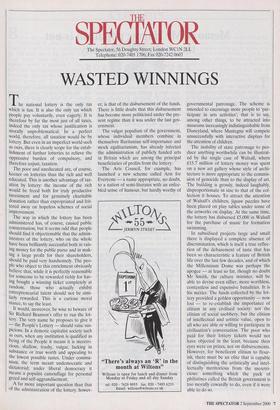S P E CTAT THE O R The Spectator, 56 Doughty Street, London WC1N 2LL
Telephone: 020-7405 1706; Fax 020-7242 0603
WASTED WINNINGS
The national lottery is the only tax which is fun. It is also the only tax which people pay voluntarily, even eagerly. It is therefore by far the most just of all taxes, indeed the only tax whose justification is morally unproblematical. In a perfect world, therefore, all taxation would be by lottery. But even in an imperfect world such as ours, there is clearly scope for the estab- lishment of further lotteries to relieve the oppressive burden of compulsory, and therefore unjust, taxation.
The poor and uneducated are, of course, keener on lotteries than the rich and well educated. This is another advantage of tax- ation by lottery: the income of the rich would be freed both for truly productive investment and for genuinely charitable donation rather than expropriated and frit- tered away on hopeless schemes of social improvement.
The way in which the lottery has been administered has, of course, caused public consternation, but it seems odd that people should find it objectionable that the admin- istrators of the lottery, who on the whole have been brilliantly successful both in rais- ing money for the public purse and in mak- ing a large profit for their shareholders, should be paid very handsomely. The peo- ple who object to this enrichment obviously believe that, while it is perfectly reasonable for someone to be rewarded richly for hav- ing bought a winning ticket completely at random, those who actually exhibit entrepreneurial talent should not be simi- larly rewarded. This is a curious moral stance, to say the least. It would, moreover, be wise to beware of Sir Richard Branson's offer to run the lot- tery. The very name he proposes to give it — the People's Lottery — should raise sus- picions. In a demotic capitalist society such as ours, when any institution is qualified as being of the People it means it is meretri- cious, shallow, trashy, vulgar, lacking in substance or true worth and appealing to the lowest possible tastes. Under commu- nism, the term meant undemocratic and dictatorial; under liberal democracy it means a populist camouflage for personal greed and self-aggrandisement. A far more important question than that of the administration of the lottery, howev- er, is that of the disbursement of the funds. There is little doubt that this disbursement has become more politicised under the pre- sent regime than it was under the last gov- ernment.
The vulgar populism of the government, whose individual members combine in themselves Ruritanian self-importance and mock egalitarianism, has already infected the administration of publicly funded arts in Britain which are among the principal beneficiaries of profits from the lottery.
The Arts Council, for example, has launched a new scheme called Arts for Everyone — a name appropriate, no doubt, to a nation of semi-literates with an enfee- bled sense of humour, but hardly worthy of governmental patronage. The scheme is intended to encourage more people to 'par- ticipate in arts activities'; that is to say, among other things, to be attracted into museums increasingly indistinguishable from Disneyland, where Mantegna will compete unsuccessfully with interactive displays for the attention of children.
The inability of state patronage to pro- duce anything worthwhile can be illustrat- ed by the single case of Walsall, where £15.7 million of lottery money was spent on a new art gallery whose style of archi- tecture is more appropriate to the commis- sion of genocide than to the display of art. The building is grossly, indeed laughably, disproportionate in size to that of the col- lection it houses. To attract the attention of Walsall's children, jigsaw puzzles have been placed on play tables under some of the artworks on display. At the same time, the lottery has disbursed £5,000 in Walsall for the purchase of music for formation swimming.
In subsidised projects large and small there is displayed a complete absence of discrimination, which is itself a true reflec- tion of the debasement of taste that has been so characteristic a feature of British life over the last few decades, and of which the Millennium Dome was perhaps the apogee — at least so far, though no doubt Mr Smith, the culture minister, will be able to devise even sillier, more worthless, contentless and expensive banalities. It is his métier. The funds collected by the lot- tery provided a golden opportunity — now lost — to re-establish the importance of elitism in any civilised society: not the elitism of social snobbery, but the elitism of intellectual and artistic value, open to all who are able or willing to participate in civilisation's conversation. The poor who paid for their lottery tickets would not have objected in the least, because their eyes were on prizes, not on disbursements. However, for beneficent elitism to flour- ish, there must be an elite that is capable of distinguishing the artistically and intel- lectually meritorious from the meretri- cious: something which the pack of philistines called the British government is too morally cowardly to do, even if it were able to do so.


























































 Previous page
Previous page